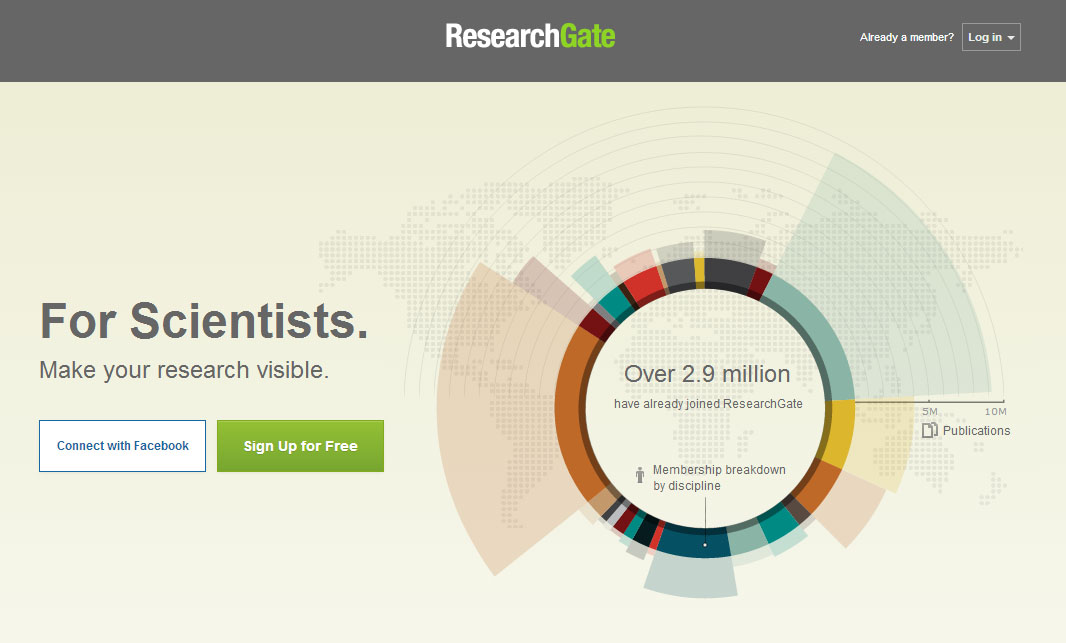What Social Network Suits Researchers?
Lets me just say it before I begin, researchers are primarily introverts, which means that a dozen or more social networks for researchers have an uphill battle to maintain. Facebook success, has spawned several social network for researchers, however none of these have been successful in bringing majority of researchers online. Success of a social network depends on the rate at which its users share and interact: here lies the problem , researchers are highly conservative and essentially introverts. It is incredibly hard for researchers to differentiate between collaborators and competitors online, hence choosing to keep their research to themselves and keeping quiet seems to be the best option. Time and attention are scarce commodities for a researcher and they just don’t see a benefit in diverting their attention to these social networks for researchers.
However, there might be a silver lining, the next generation of “always online” users, now in the early stages of their research career are increasingly turning towards these networks, giving hope that we might be finally at a tipping point. We wanted to take a closer look at the top social networks meant for researchers and see what their strengths and shortfalls are and if they have what it takes to keep their users coming. The top three networks by their registered users and unique monthly users are Mendeley, ResearchGate and Academia.edu. We are also taking into consideration LinkedIn here, since it has a large number of researchers in its 200 million plus registered users. Although these social networks claim to have different aims, their primary aim is to increase communication among researchers/academicians.
Mendeley
Mendeley is publicized as a free reference manager and an academic social network. Inspired by Myspace. Instead of music, publications here are the central theme. It has more than 2.3 million users across the world, the most popular discipline being biological sciences.
Pros: Its most powerful feature is its free application that helps academicians manage huge collection of papers by automatically extracting data from PDF papers, allowing reading and collecting notes from papers, full-text search, tagging, smart filtering, helping in importing papers & documents from external websites and also helps in writing papers by automatically generating citations, among other things. Other important feature is its related research suggestions that help users find papers similar to their collection or area of interest using semantic analysis and tags added by other users to their papers. Has an open API that can be used by developers to build apps on top of Mendeley’s data surrounding its user’s 200 million plus papers. Popular apps built so far include Total-Impact.org, Hojoki, OpenSNP and ReaderMeter.org.
Cons: The free 2GB space provided by Mendeley is too little when it comes to sharing huge datasets and the premium space can prove to be costly for academics and research institutions. When it comes to actual advantages of social networks such as collaboration and getting answers to your questions, one has to look elsewhere. There are very few popular groups with very limited participation from its members and little discussion going on. Although it has a research recommendation tool, it lacks a user recommendation feature which could help grow a user’s networks. It lacks profile viewed data that its other competitors provide. The biggest drawback might be that Mendeley is now owned by Elsevier, one of the most academically hated publishers which confines ground breaking research under exorbitantly priced journals, going completely against what social networks are destined to do.
ResearchGate
ResearchGate formed in 2008 by scientists for scientists, has close to 3 million users and counts Bill Gates as one of its investors/supporters. Biological science is the largest discipline here, followed by engineering and chemistry. It takes almost all of its inspiration from the big three: Facebook, Twitter and LinkedIn. It has features such as profile and live-feed similar to Facebook, ability to follow and get followed similar to Twitter and ability to form groups (project) and endorse other users similar to Linkedin. Its main aim is to drive collaboration among researchers.
Pros: ResearchGate has one of the most active user base and a large question and answer database that’s maintained by its users. Questions are segregated by their topics and based on the topics a user has selected he/she will receive updates regarding new questions and answers on their feed stream and also via emails. What better is that these questions are archived by Google search. Other useful features are the reputation score that uses the user’s activity on its topics and the papers shared by them. Users can also view the times their profile has been viewed. Has the best user interface and design amongst the three social networks mentioned here and has come a long way since its facebook knockoff days. It also allows users to share data securely with other users via the ‘Projects’ tool to get real-time feedback from their peers and other collaborators. Allows adding of skills for which users can get endorsed by their followers.
Cons: ResearchGate apparently does not want users others than those from the academic world amongst its users. An institutional email is of utmost importance when creating an account here, hence if you are out of college you are out of luck. ResearchGate has the lowest ratio of unique monthly visitor to registered users at 1.08. While Reputation Score is an important metric, it doesn’t count for much outside ResearchGate. There is currently no API that can be used by app developers; however in the recent funding is going to make one possible. ResearchGate also takes its anti-spamming policies a bit too seriously with a lifetime ban coming your way if you are seen contacting one too many users or have asked a question that is against the network’s policies.
Academia.edu
Launched in 2008, currently with more than 2 million users, Academia.edu’s aim is to allow researchers to share their research openly and monitor its impact. It allows users to follow the work of other researchers, universities and research interests.
Pros: Academia.edu is said to fare very well on Google results thereby increasing the visibility of the papers shared by its users. Provides useful data for profile and document views, such as keywords, referrers, and countries from where the users came.
Cons: Academia.edu has hardly seen any change since its launch five years ago in terms of adding new features or even changing it UI. Users cannot form groups/ topics and cannot ask questions to a particular group (a feature which is said to have been removed), thereby limiting communication between users. Features such as similar research papers and user recommendations are also missing. Lacks an open API that can be used to create apps and put its profile and document view stats to any good use.
LinkedIn is a social network for professional from every walk of life and not just researchers and academics. It has more than 200 million users across the world, of which approximately 2 million are the users that the above networks are specifically meant for.
Pros: Users can create detailed profiles and allow their peers to add testimonials. Although it lacks a tool to upload research papers, researchers can link their papers and upload their presentations to Slideshare. Users rank high on Google search and are usually the first result for most users. Gives you ability to endorse others for their skills and get endorsed for your skills. Provides limited profile view stats and names of the Linkedin users who visited you profile. It is accessible via a smartphone thanks to its Android and iOS app alongside a mobile optimized website. Another very important attribute about LinkedIn is its connectivity with the industry and its extensive use by recruiters as a way to discover new candidates, therefore it pays to have an account here.
Cons: Most advanced features on LinkedIn require a premium account, such as sending messages to users not in one’s contact list, or even to see the complete list of viewers viewing a profile, etc. Compared to other social networks on this list, users experience increased spamming in the form of friends requests from unknown people and messages seeking surveys, endorsements, etc. Allows only manual entry of published papers. Lacks any form of reputation/impact points or ability to verify the claims made by an individual in his or her profile.
| ResearchGate | Mendeley | Academia.edu | ||
| Users | 3 million + | 2.3 million + | 2 million + | 200 million + |
| Aim | Aiding Collaboration | Cloud Reference Management | Open Access to Knowledge | Networking |
| Features |
Responsive Q&A Topics Reputation Points Project Collaboration Tool Follow Recommendations |
Reference Management Software Groups Research Recommendations |
Extensive Profile View Stats |
Groups Blogs Testimonials Recommendations |
| Locating Your Work |
Recommendations based on Author name Uploading via reference manager Manual Entry/Uploads |
Manual Entry/Uploads Allows adding papers via desktop app |
Manual Entry/Upload Search and add Import from Homepage |
– |
| Free Space | Unlimited | 2 GB | – | N/A (Depends on Slideshare) |
| Profile Views Data | Yes | No | Yes | Yes |
| Paper Views Data |
Total Views Download Stats Citations CountUp & Down Votes |
Total Views Readership Stats Demographic Stats Discipline Stats Academic Status Stats |
Yes | No |
| Connecting with others | Follow | Add Contact | Follow | Connect or Follow |
| Contacting Others | Can Message Only Followed Users | Send messages to any user | Send messages to any user | Only to |
| Open API | No | Yes | No | Yes |
| Mobile App/Mobile Website | No (Has an iOS reference manager) | No | No | Yes |
| Source of Revenue | Job Postings | Premium Accounts | Job Postings | Jobs Postings, Ads, Premium accounts, etc. |
Whats Missing in Social Networks for Researchers?
We can’t point out one social network for researchers here as the one that suits a career in best (If forced to pick, it would be a tie between Researchgate and Mendeley), while ResearchGate has a lot of features and a growing number of active users, it lacks a reference manager and has strict user registration policies. On the other hand while Mendeley has a huge database of shared papers and data regarding these papers, it lacks user profile view data. One of the biggest drawbacks with all three here is the absence of a mobile compatible website or an app. With more and more users accessing social networks on their smartphones rather than the desktop, it is essential for these social networks to adapt quickly before they lose the users they currently have.
Do let us know what you think is the best social network for researchers and the benefits you have so far seen in being part of them.





